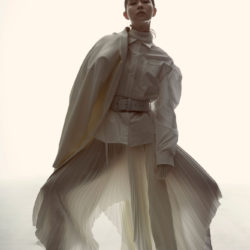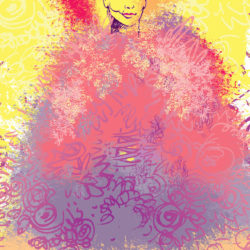The rising British actress, Sophie Cookson, seeks roles that test her limits, otherwise what’s the point?
CREATIVE DIRECTOR ALAN ABOUD PHOTOGRAPHER JULIAN BROAD PHOTOGRAPHER ASSISTANT SOPHIE FODEN-PATTINSON DIGITAL OP JOE COLLEY FASHION STYLIST ELLIE WITT FASHION STYLIST ASSISTANT SANDRA BLAZINSKAITE HAIR STYLIST PATRICK WILSON MAKE-UP ARTIST LIZ DAXAUER LOCATION HOWE LONDON INTERVIEW CHRISTIAN CHENSVOLD





After bursting on the scene in 2014’s stylish spy flick Kingsman: The Secret Service, as well as its 2017 follow-up, London-based actress Sophie Cookson has gone on to star opposite icon Judi Dench in Red Joan in 2018. She will next dazzle audiences in the BBC miniseries The Trial of Christine Keeler, in which she plays the real-life woman at the heart of the Profumo Affair, a scandal that rocked English politics in the swinging sixties. Veni caught up with the actress, who had just wrapped and was looking forward to reading and exercise.
VM: You just finished an exhausting shooting schedule. An actor can develop her craft, but then has to adapt to the often grueling work conditions. What was that like?
SC: With this project, I fell in love with the script, and because it was written, directed and produced by women, it had an incredible energy around it. That really gave me drive. Also, playing a historical character who was dealt a hard hand — you want to correct that perception. There were so many good reasons to get up in the morning.
VM: What about adapting to the fame aspect of your work? This is your art, but with it comes all this other stuff that I imagine is both a blessing and a curse.
SC: Christine Keeler in the ’60s was the most photographed woman in the world, hounded by the press. I’ve been lucky and haven’t experienced too much of it, however I did just see for the first time a bus with my face on it! I had a scream in the cafe with my friends. I like to live in the present, and thinking too much about the future, therein lies madness. I want to have a career I’m proud of and make the right choices. The fame aspect is incredibly daunting, but it doesn’t keep me up at night because you just have to get on with your stuff.
VM: How did Oxford prepare you for the work you’re doing now? Is it very theatre based, or did it also prepare you for film and television?
SC: It was very traditional training and mostly based on theater. I always had interest in acting, but technically I was a bit green. You work insane hours and learn you have to put everything into it. It’s a very emotional journey that you go through — it’s not an easy 3 years. But by the end I was very hungry to start working, because it’s impossible to understand what a film set is like if you’re on a farm in drama school.
VM: Do you have a certain ritual for getting into character?
SC: I think it depends on the process. With Christine Keeler, it was the first time I’d played a real-life character. There was so much information out there, so that had its own intricacies. Then when you’re doing something more physical, it’s nice to mix it up so you’re not always using the same techniques.
VM: What is it like working in the changing media landscape, with so many independent content producers? As an actor it must be great.
SC: It’s definitely a great time with the huge wealth of material out there. The new platforms allow people with relatively little experience to put their ideas out there. But it’s also harder in some sense, because you need to find what’s really going to get you going, which can be quite tricky. There’s so much getting made, but not all of it is high in caliber. There’s something for everyone, but there are so many genres, that finding something that checks all of the boxes for you is rare.
VM: What are the boxes you want to check off before you sign on to something?
SC: I always try to only do projects that I wholeheartedly believe in. Obviously when you’re starting out you don’t always have that luxury, but for me it’s always about being challenged. Unless you’re excited about the project, it’s hard to do your best work, to put your heart and soul into it. For me there’s just a feeling you get when you read something and it makes you want to read more. When I sit down and read a whole script in one go, then I know it’s probably right. There’s no point in doing something that isn’t testing your limits and seeing what you’re capable of.
VM: What’s your advice for young women getting into the business?
SC: It’s definitely about perseverance. If you’re willing to be rejected a lot, then no matter how many times somebody says no, if you really want to do it, then you’re capable. It’s about digging in and not letting anyone tell you that you can’t do it. You have to have real strength to be able to block that out.
VM: But you’ve been very fortunate and went to work right after drama school.
SC: Yes, but between all those projects that people see, there are months of unemployment. For every one job you get, it’s an endless round of sending out tapes and meeting directors. The reality is incredibly different.
VM: There’s a certain spy theme to the work you’ve been doing.
SC: Yes it’s funny how that happened! It certainly wasn’t a conscious choice. But it’s certainly an interesting world. People love secrets, and the audience loves being taken on an unknown journey that is mysterious and thrilling, so it’s definitely an appealing genre. But it’s not a conscious choice.
VM: Maybe it’s a subconscious choice.
SC: Yes, maybe I was a spy in a previous life.







